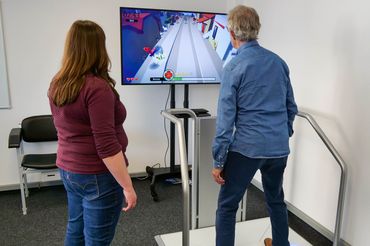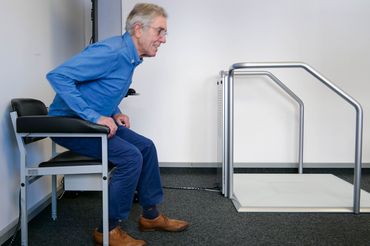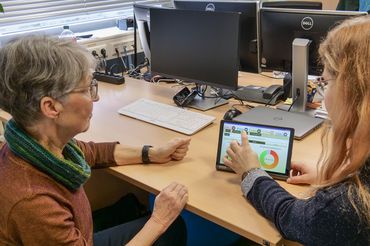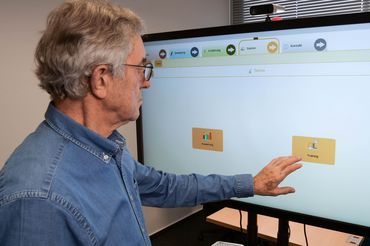AS-Tra
Contact AS-Tra study team
Head of study
Study Team
![BMBF_CMYK_Gef_M [Konvertiert]](/f/6/_processed_/3/2/csm_BMBF_gefoerdert_2017_en_9d9a3028e0.jpg)
AS-Tra
Assistance System for sustainable improvement of nutritional and mobility status of older people under consideration of the Transtheoretical Model of health behaviour change
Background
Many older people suffer from deficits in nutritional and physical activity status, two mutually interacting elements that often go unrecognised for a long time in standard health care. Interventions such as physical and/or nutritional therapies often only take effect when deficits have already manifested themselves; moreover, physical training of older people is rarely coordinated with nutritional therapy interventions and psychological models for the sustainability of behavioural change are rarely taken into account. A good nutritional and physical activity status is the basis for the prevention of falls, which often leads to the need for care or a reduced quality of life. An addition to standard care therefore appears to be useful to make it easier for older adults to optimise their nutrition and physical activity behaviour or to stabilise it at a good level.
Approach
In the "AS-Tra" project, a technical assistance system is being developed and evaluated with the help of a user-centred approach involving older people aged 70 and over. The system offers possibilities for independent exercise and nutrition testing and thus for early detection of possible risks through two elements: a tablet-based app and an assessment and training station for independent use. The personalised intervention promotes healthy eating and physical activity behaviour by taking into account the Transtheoretical Model of Behaviour Change by DiClemente and Prochaska, in which the content is adapted to the needs and goals of the senior citizens.
The project "AS-Tra" is divided into three sub-studies:
First, the measurement and training station as well as the tablet-based app are to be developed or completed. In order to achieve a high level of usability and to align the development with the needs of the target group, senior citizens will be involved in the development in the form of focus group discussions and piloted usage studies.
In the third sub-study, the optimised assistance system is used by the target group for 12 weeks in a two-armed randomised controlled survey. Possible sustainable behavioural changes of the elderly as well as effects on the nutritional and physical activity status of the intervention group vs. a control group receiving standard care will be recorded. The plan to test the assistance system in the long term will also provide valuable insights into the barriers older people face when using modern technology.
Throughout the project, possible approaches for the implementation of technical assistance in the health care of seniors will be discussed with relevant stakeholders from the health care sector in regular workshops. This is to ensure that the assistance system can be integrated into the existing health care system in the best possible way and that it is also considered useful and suitable for use by experts in geriatrics, nutrition and physiotherapy, for example.
Advisory board
What is the advisory board?
Our project advisory board plays an important role in the AS-Tra project. As an advisory board, it ensures that the research meets the needs and interests of the target group - older people over 70 with nutritional and/or mobility deficits. In contrast to the study participants, the members of the advisory board are actively involved in the research and conduct research together with the study team.
In our project, we have established a project advisory board with nine committed members over the age of 70. Since December 2022, we have already held four meetings in which we were able to benefit from their valuable input. Working with the advisory board enriches our research and ensures that it has a positive impact on society.
The tasks of the advisory board include optimizing the experimental design, advising on the implementation of the study, interpreting the results and reviewing the information materials. With their expertise and experience, they help to ensure that the measurement and training station and the associated app are accessible to older people and that meaningful results can be delivered.
Interim result
Publications
Publications (peer review)
- Happe L, Sgraja M, Quinten V, Förster M, Diekmann R. Requirement analysis of different variants of a measurement and training station for older adults at risk of malnutrition and reduced mobility - a focus group study. JMIR Aging 2024;7:e58714.
- Happe L, Sgraja M, Hein A, Quinten V, Diekmann R. Usability and feasibility of a tablet-based e-coach for older adults in rehabilitation units to improve nutrition and physical activity: a prospective pilot study. BMC Geriatr 2023, 23: 578. IF 4.1 (2022)
- Brinkmann A, Kowalski C, Lau S, Meyer O, Diekmann R, Hein A. Chair squat performance as a potential predictor of nurses’ physical capabilities in ergonomic patient transfers. Scientific Reports 2023, 13(1): 1-10. IF 4.996 (2021)
- Pauls A, Bauer JM, Diekmann R, Fudickar S, Hein A, Hellmers S, Lau S, Meyer J, von Holdt K, Koppelin F. Motivationsgründe und Vorstellungen über eine zukünftige Beteiligung älterer Menschen im Forschungs- und Entwicklungsprozess von Gesundheitstechnologien-eine Mixed Methods-Studie. Das Gesundheitswesen 2023, 85:895-903. IF 1.1 (2022)
- Büker L, Quinten V, Hackbarth M, Hellmers S, Diekmann R, Hein A. How the Processing Mode Influences Azure Kinect Body Tracking Results. Sensors 2023, 23(2): 878. IF 3.9 (2022)
Congress contributions
- Gemeinsamer Workshop von ITG und Plattform – Charité Versorgungsforschung Digitalisierung der Gesundheitsversorgung älterer Menschen – Berlin. Förster M., Happe L., Quinten V., Diekmann R. (2023, Juli) AS-Tra – Entwicklung eines technischen Assistenzsystems zur Verbesserung von Ernährung und Mobilität im Alter. Posterbeitrag beim gemeinsamen Workshop von ITG und Plattform-Charité Versorgungsforschung zur Digitalisierung der Gesundheitsversorgung älterer Menschen
- Förster M, Happe L, Quinten V, Diekmann R. As-Tra – nutzerzentrierte Entwicklung, Evaluation und Implementierung eines technischen Assistenzsystems für ältere Menschen zur nachhaltigen Verbesserung der Ernährungs- und Bewegungssituation. 23. Deutscher Kongress für Versorgungsforschung (DKVF). Düsseldorf: German Medical Science GMS Publishing House; 2024. Doc24dkvf201.
- Diekmann R., Förster M, Quinten V., Happe L., (2024) As-Tra-Assistenzsystem zur nachhaltigen Verbesserung des Ernährungs- und Mobilitätsstatus älterer Menschen unter Berücksichtigung des Transtheoretischen Modells der Verhaltensänderung. Zeitschrift für Gerontologie und Geriatrie, 57(Suppl 2), S191. www.gerontologie-geriatrie-kongress.org/files/ggkongress/2024/202409_kassel_abstractband.pdf
- Happe L, Quinten V, Förster, Hinrichsen J, Diekmann R. Bridging the Gap: User-Centered Development and Evaluation of a Technical Assistance System to Promote Nutrition and Physical Activity among Older Adults. EUGMS 2024
- Happe L, Sgraja M, Quinten V, Diekmann R. Welche Gesundheitsdaten und Trainingsformen bevorzugen ältere Menschen mit Ernährungs- und Mobilitätsdefiziten in einer eigenständig nutz-baren Mess- und Trainingsstation? Eine qualitative Fokusgruppenstudie. Physioscience 2024;20(S 01):S01-S02.
- Diekmann R, Happe L, Sgraja M, Quinten V, Hein A (2023). Qualitative Bedarfsanalyse zu Elementen einer Mess- und Trainingsstation für Personen über 70 Jahren mit Risiko für Mangelernährung und Mobilitätsdefiziten - eine Fokusgruppenstudie. Jahreskongress der Deutschen Gesellschaft für Geriatrie, Frankfurt. Zeitschrift für Gerontologie und Geriatrie, 56(Suppl 2), 25–99.
- Happe L, Förster M, Quinten V, Diekmann R. Iterative Development and Applicability of a Measurement and Training Station for Older Adults to Independently Assess and Improve Nutrition and Mobility. Eur Geriatr Med 2023;S1-S387:S267.
- Happe L. , Sgraja M., Hein A., Diekmann R, (2022). Anwendbarkeit einer tablet-basierten App zur Unterstützung des Ernährungs- und Bewegungsverhaltens bei Rehabilitationspatient*innen (70+) begleitet durch eine Ernährungs- und Physiotherapeutin – Pilotstudie. FSPT Freiburg.
- Happe L, Sgraja M, Hein A, Diekmann R. Ist eine neu entwickelte Tablet-basierte Ernährungs- und Bewegungs- App, begleitet durch Ernährungsberatung und Physiotherapie von Rehabilitationspatient*innen (70+) anwendbar? M0526; 21. Deutscher Kongress für Versorgungsforschung (DKVF) 2022; Deutsches Netzwerk Versorgungsforschung; Potsdam; 20221005-20221007




